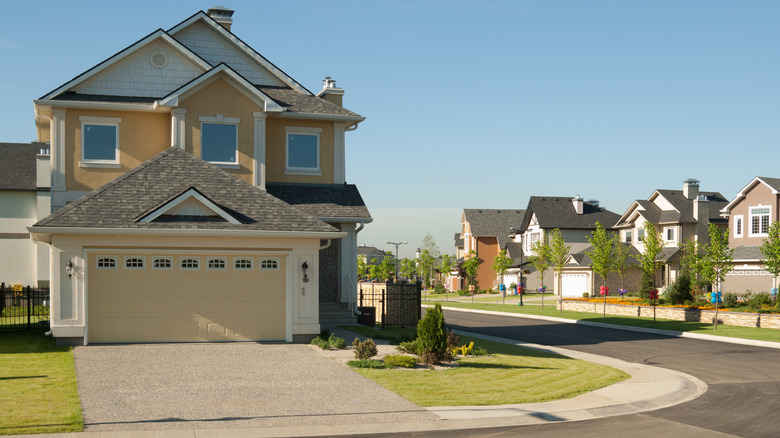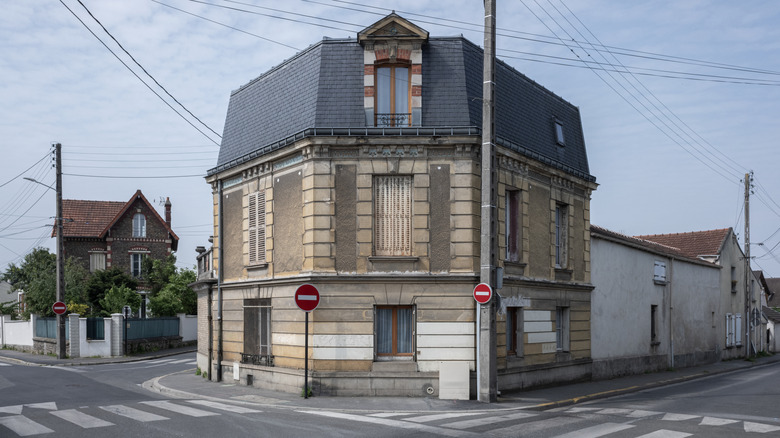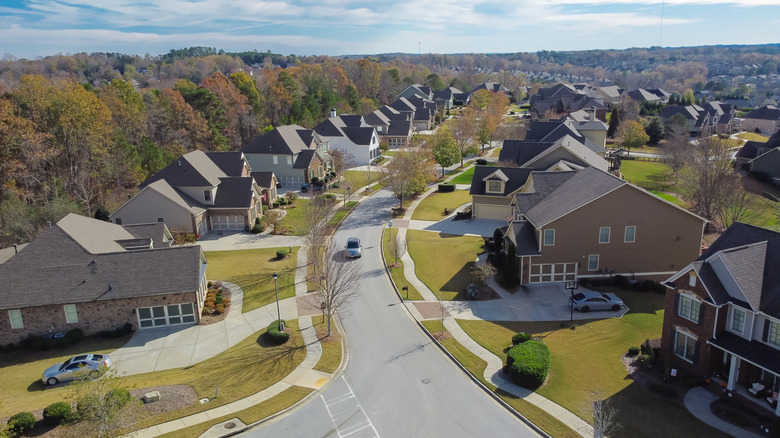The Downsides To Buying A Home On A Corner Lot
Corner lots are often seen as very desirable by those who are on the market for a new home. They offer a range of benefits — perhaps most notably all that additional property and yard space. However, before you jump at the opportunity to purchase a home on a corner lot, there are a few downsides you'll want to consider. House Digest spoke exclusively to Jon Wade, a real estate expert, resort market professional, and the broker owner at The Steamboat Group, to learn more. He said, "While corner plots can offer more space and curb appeal, they do come with several drawbacks that buyers should consider. One of the biggest downsides is that these properties often have higher price tags due to their premium positioning, but that visibility also means less privacy and increased exposure to noise and traffic."
Ahead, we'll take a deeper dive into these and other downsides of purchasing a home on a corner lot, such as higher maintenance and landscaping costs. We'll also explore the potential benefits of corner lots shared by Wade to arm you with all of the facts you need to make an informed decision about whether buying a property on a corner lot is right for you.
Consider these downsides before purchasing a home on a corner lot
Corner lots aren't for everyone, and you'll want to carefully evaluate their downsides before signing a contract. "If you're a light sleeper or prefer a quieter home, you might want to consider another option, as corner properties often experience more footfall and passing vehicles," shares Wade in an exclusive interview with House Digest. Purchasing a corner lot can also be more expensive. Beyond the premium that you'll pay for the home itself, those additional expenses may continue after you've moved in.
"Maintenance costs can be higher, as corner plots typically require more fencing, larger lawns, and additional landscaping to maintain their appearance on two street-facing sides," explains Wade. The cost to build a privacy fence is already high enough — tacking on additional square footage to cover a larger lot will only result in an even higher bill. Wade also highlights the possible expense to cover home security systems, motion sensor lighting, or other safety-related needs. He explains, "Security can also be a concern, as multiple access points, such as extra gates, driveways, or exposed side entrances, can make the property more vulnerable to trespassing or break-ins."
Some people who are looking for a corner lot have a plan to extend the home in the near — or distant — future. However, there are many things to consider before building a home addition. And, according to Wade, one of these is whether you can actually extend the property. "Local regulations may impose stricter building restrictions, limiting future development," he says.
Is a corner lot right for you?
In an exclusive interview with House Digest, Wade also highlights several benefits associated with purchasing a home on a corner lot. "These plots are often larger than standard ones, providing more garden area, a bigger driveway, or even room for future extensions... this additional space can be a huge selling point," he says. The additional yard space could allow you to enhance the home's curb appeal through various landscaping and architectural elements.
According to Wade, a home on a corner lot often gets more natural lighting than those in the middle of the street. "With fewer neighboring buildings blocking sunlight, these homes can have more windows on multiple sides, creating a brighter and more open interior," he notes. Beyond an improved ambiance, more natural lighting can also mean decreased energy costs since you'll rely less on artificial lighting to brighten your space.
There are several factors to consider when purchasing a home. "Choosing a home on a corner lot comes down to personal priorities and lifestyle needs," explains Wade. The extra space, natural lighting, and enhanced curb appeal can make them appealing to many buyers. However, you'll have to weigh these up against the potential disadvantages associated with corner lots, like greater exposure to noise and less privacy. If you're still unsure whether a corner lot is going to work for you and your family, Wade recommends making visits to the property at various times. This can help you get a better idea of whether or not these potential drawbacks will turn into real issues.


